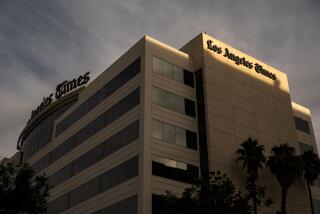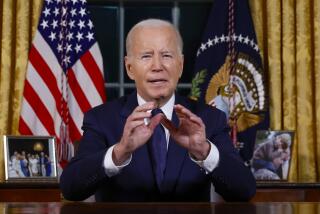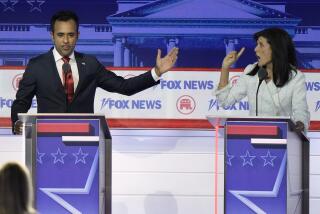Editorials Reflect Public Ambivalence About War
NEW YORK — As war with Iraq looms, the editorial pages of many American newspapers have taken unexpected positions in the national debate, shedding longtime political labels and in some cases defying conventional wisdom.
In New York, for example, Newsday’s often progressive editorial columns have reluctantly backed U.S. military action “even without U.N. consent.” The Orange County Register, a traditionally conservative publication, has been openly skeptical that President Bush has made the case for war.
Similar anomalies have been found on editorial pages from Oregon to Florida, and they reflect the complex wrangling over war in Iraq that has played out in millions of American living rooms. While U.S. editorial pages had varying but fairly consistent responses to other recent national controversies, opinion on the war with Iraq and America’s role in the world has evolved slowly, often with deep ambivalence.
“Editorial positions at many newspapers have been changing during recent months, and that’s because this is one issue where the old ideas of left versus right don’t really apply,” said John Taylor, president of the National Conference of Editorial Writers and the editorial page director of the News Journal in Wilmington, Del. “We’ve been flummoxed by shifting sands, and this newspaper debate reflects so much of what has been going on in the rest of the country.”
At the Washington Post, an editorial page that is normally a thorn in the side of the Bush administration has been hawkish on the need for war. “We believe Mr. Bush is right to go forward despite opposition from France and other nations,” it said in a Sunday editorial. At the generally conservative Peoria Journal Star in Peoria, Ill., however, a recent editorial voiced growing grass-roots concern about the possibility of war, noting: “The United States is not always right. Maybe this time the world is.”
“A good editorial forces people to think and confront new ideas. It doesn’t merely reinforce existing opinion,” said Bob Steele, director of the ethics program at the Poynter Institute, a media think tank in St. Petersburg, Fla. “There are shades of gray on this issue, and a liberal paper might have a very different perspective after Sept. 11. A paper that is fundamentally conservative may be very skeptical now about any war with Iraq.”
Editorial page directors from coast to coast report a higher than normal level of response to editorials about Iraq in recent months. And the tide of public opinion in those letters has shifted back and forth.
A key reason for the heightened impact of editorials may be the relative silence of Congress, several experts say. Unlike in the period before the 1991 Persian Gulf War, which was preceded by an intense congressional debate, there has been scant discussion about the controversy in either the House of Representatives or the Senate, both of which approved a resolution paving the way for possible military action months ago.
With so many Americans still needing more information to make up their minds, newspaper editorials have helped to fill the void, along with talk radio shows, all-news cable TV broadcasts, the Internet and a variety of other media, according to Jay Rosen, an author and chairman of the journalism department at New York University.
“Newspaper editorials are bound to play a greater role in the national discussion, especially at a time when the normal channels of discussion, like Congress, are silent or have been stilled for different reasons,” he said. “There’s way more debate on this issue among Americans themselves now than among their elected representatives.”
On some editorial pages -- such as those of the Chicago Tribune and the Wall Street Journal -- the Bush administration’s agenda is seen as a principled, necessary response to a rogue regime with weapons of mass destruction. Other newspapers, like the San Francisco Chronicle, have been consistent opponents of the war and skeptical about America’s geopolitical motives. The majority of editorial page opinion, however, seems to have fallen into an anxious middle ground, an ideology-free zone where newspapers believe that Saddam Hussein’s regime must be dealt with but fear the consequences of America’s acting without broad international support.
Although there are no definitive surveys, Editor & Publisher -- a weekly magazine about the newspaper industry -- has periodically assessed gradations of editorial opinion on the war. In its most recent look at 43 leading American newspapers, the magazine reported that 18 were in favor of war while 25 wanted to give diplomacy an additional chance. Of the latter, 12 wanted to briefly extend the deadline for war, while 13 editorialized that weapons inspectors deserved more time.
“So many papers are trying to sort things out, and as the situation keeps changing, so do editorial opinions,” said Phil Haslanger, managing editor and former editorial writer at the Capital Times in Madison, Wis.
The New York Times editorial page is a good example of the ambivalence and conflicting priorities that many Americans have experienced. During the four months since the United Nations passed Resolution 1441 -- mandating international inspections and warning Iraq of severe consequences if it failed to comply -- the paper has generated more than 43 editorials on the issue.
In a lengthy editorial last week, the Times gave readers its bottom line: “If it comes down to a question of yes or no to invasion without broad international support, our answer is no.”
Yet the paper reached this point only after months of exploring numerous aspects of the controversy. It excoriated the Bush administration for heavy-handed diplomatic tactics; criticized France for obstructionism at the United Nations; blasted Saddam Hussein as a threat to world peace; agreed that war might be necessary; said the U.S. military buildup was a key reason why arms inspections might be working; but ultimately said no to a unilateral war by U.S. forces.
At the Los Angeles Times, the paper summed up its position in an editorial Friday titled “The Right Way,” acknowledging the arguments on all sides but concluding that “the Bush administration’s months of attempts to justify quick military action against Iraq have been confusing and unfocused.”
The paper added that “this nation cannot muscle its way out of all of its international disputes. The United States, in word and deed, must do nothing to undermine the crucial tool of diplomacy in resolving conflict.”
“We did struggle with this issue from the beginning, because it was so complex,” noted Janet Clayton, editor of the editorial pages. “And when we finally wrote the editorial laying out our position, I worried about timing, when to run it.
“We didn’t want to write anything assuming that war was inevitable,” she said. “To the very end, we had always hoped there was a chance for a diplomatic solution.”
*
(BEGIN TEXT OF INFOBOX)
Newspapers speak their peace, war
Excerpts from U.S. newspaper editorials:
“Under traditional American constitutional precepts, is a war justified by the United States against Saddam Hussein’s regime? The founders believed that America should be a beacon to the world, but should protect only its own freedom. Some people believe that Iraq poses a direct threat to America. We, however, find evidence lacking.”
Orange County Register, March 2
“In the United States, where a substantial majority of the public supports military action to disarm Saddam Hussein, there have nevertheless been large and passionate demonstrations in opposition.... We continue to believe that war with Iraq will be necessary, unless there is a dramatic change in Baghdad.”
Washington Post, Feb. 23
“The failure to secure international backing for an attack on Iraq has angered Americans who believe the world owes us the help.... Conventional wisdom had held that the lone elephant among the mice who occupy the globe would get its way by virtue of pressure or payout. That this has not happened is one mighty powerful reason to change direction.”
Peoria (Ill.) Journal Star, March 13


